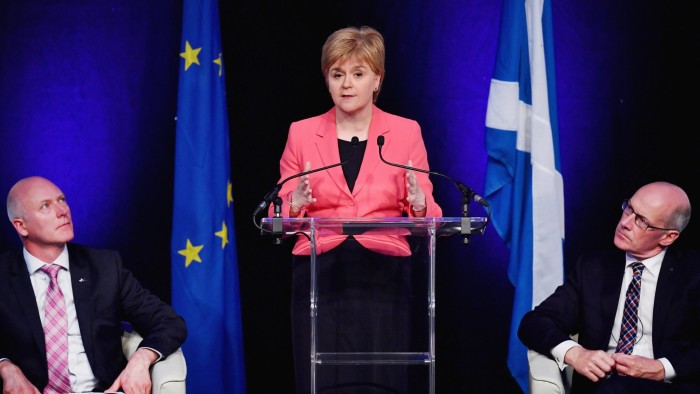After Brexit vote, Scotland reassesses benefits of break from UK

Supporters of the three century-old union between Scotland and England cannot say they were not warned. Before the EU referendum, Scottish National party leaders had made it very clear they would consider a vote for Brexit as grounds to revisit the question of Scottish independence.
The manifesto on which the SNP government won a landslide re-election just a month before the EU referendum insisted that Scotland would have the right to demand another vote on independence if it were to be dragged out of the EU “against its will”.
So it should come as little surprise that the June 23 result has revived uncertainty about the constitutional future unity of the UK that was supposed to have been settled by Scotland’s first independence referendum just two years ago.
Hours after the Brexit victory was declared, Nicola Sturgeon, SNP leader and Scotland’s first minister, announced at a hastily arranged press conference that a second independence referendum was now “highly likely”.
“We proved that we are a modern, outward-looking, open and inclusive country. We said clearly that we do not want to leave the European Union,” Ms Sturgeon said, standing in front of Scottish and EU flags in the drawing room of her official residence in Edinburgh.
“I am determined that we will do what it takes to make sure that these aspirations are realised.”
Yet independence supporters who saw the Brexit divide between England and Scotland as a shortcut to constitutional separation have so far also been disappointed.
Opinion polls in the immediate aftermath pointed to a substantial rise in support for independence, which was rejected by voters in Scotland by 55 per cent to 45 per cent in 2014. But more recent surveys suggest that the Brexit vote has had only a marginal impact.
A Kantar TNS poll published on September 13, for example, found 47 per cent of voters backing departure from the UK when don’t knows were excluded, only two points above the 2014 result and still short of a majority.
“In the aftermath of the Brexit vote and Scotland’s contrasting position with much of the rest of Britain, the SNP would have hoped for more of an uplift in support for Scottish independence,” said Tom Costley, head of Kantar Public Scotland.
Ms Sturgeon has made clear that she would want to see a sustained clear majority for independence before pushing for another referendum, with senior party colleagues warning that losing twice in a row could be disastrous for the SNP’s cause.
“Losing a second referendum would put independence on the back burner for generations,” warned Alex Neil, former Scottish cabinet secretary, in August. “We must do all we can to avoid that happening.”
One major factor suppressing support for independence is likely to be the substantial fiscal challenges it would involve. A collapse in North Sea oil revenues since 2014 has made a mockery of SNP forecasts that leaving the UK would allow more generous spending and lower taxes.
Scottish government estimates shows the gap between public spending and revenues in Scotland widening to 9.5 per cent of gross domestic product, more than twice the deficit for the UK as a whole and high enough to ring alarm bells in any economy.
Brexit also means the SNP would have to come up with a new vision for how an independent Scotland within the EU would interact with the remainder of the UK, particularly in view of its previous proposal to continue shared used of the Bank of England and the pound — a solution that looks even less viable if Britain has left the EU.
So instead of ordering an urgent drive for independence, Ms Sturgeon, a naturally cautious politician, is playing for time. The first minister has launched a mass canvassing programme billed as a “national survey” of views on independence, an effort that will give party activists something to do while gathering useful information for future campaigns. And she has established a commission to come up with new economic and fiscal policies.
“It is as if an army platoon has been told to assemble at dawn for a fresh push — only to be told by the generals that it might now be lunchtime, or tea, or tomorrow before the attack begins,” mocked Ruth Davidson, leader of the pro-union Scottish Conservatives, in a recent speech.
Union supporters can hardly be complacent, however. The Brexit vote highlighted the increasing divergence of politics north and south of the English border. Scotland’s economy is already vulnerable and if it stalls in the next few years, affection for the UK is likely to suffer further.
Analysts say much depends on what arrangements the UK ends up with after exiting the EU, assuming it eventually does leave the bloc.
Paradoxically, a “hard” Brexit, in which the UK is no longer part of the EU single market, would be likely to both fuel Scottish anger while making independence more difficult. That is because it would require a new trade border with the rest of the UK. While Scotland’s non-oil and gas exports to other EU states were worth around £12bn in 2014, trade with the rest of the UK was much larger at nearly £50bn, according to the latest available figures from the Scottish government.
Some see possibilities for new UK constitutional arrangements that could leave Scotland and Northern Ireland with a EU presence after Brexit. Ms Sturgeon herself has described as “interesting” the idea of a “reverse Greenland” — an adaptation of the approach that in 1985 allowed Greenland, a devolved part of the Danish realm, to leave the EU while Denmark stayed in.
Any such approach would be hugely complex and require goodwill and close co-operation between Edinburgh, London and Brussels — which at this point appears unlikely. Like so much else connected with the Brexit process, Scotland’s constitutional future appears likely to remain uncertain for some time to come.
Comments